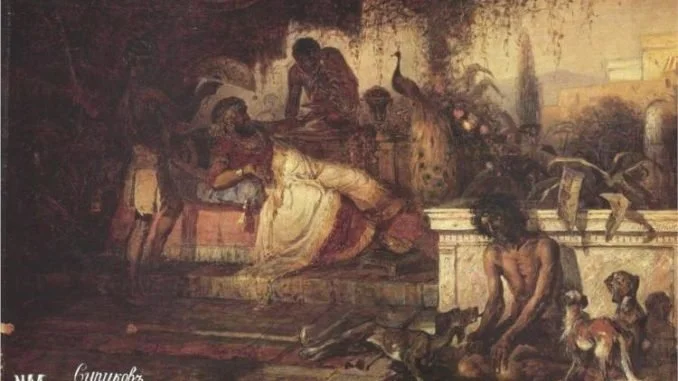Year C Proper 21 - September 25, 2022
Lazarus at the Gate
To Honor the Blessed Trinity, amen.
(Luke 16:29) "Abraham replied [to the rich man in Hades], ‘They have Moses and the prophets; they should listen to them.’”
The Bible comments more on economic oppression and social injustice than any other category of sin. According to the Hebrew Prophets, wealth and material comfort are greater temptations to mortal sin than alcohol, sex, or violence.
To be clear, possessing wealth does not make a person evil, just as poverty does not make a person righteous. But, those of us who are economically comfortable are in greater danger. We read in “Moses” (also known as the Torah) that the best protection against greed is to dedicate everything in our lives to the reign of God: money, family, possessions, our bodies, minds, and our time. The Torah’s complexity of laws weaves a lifestyle covered in prayer set on the common good. Just as Jesus teaches us, God’s law come down to loving God above all else by loving your neighbor as yourself.
In today’s passage we find Jesus addressing leaders who try to ridicule him. They pursue wealth and celebrate their power without consideration of God’s commandments. Jesus’ parable of Lazarus and the Rich Man addresses their sin.
We heard the story: Rich guy never notices Lazarus at his gate and offers no help. They both die. Lazarus rests with Father Abraham in a nice afterlife and the rich man descends into eternal fire. We don’t know anything else about them.
Poor Lazarus and the Rich Man may be similar in character. Neither man is accused of evil intentions or abhorrent sins: no murder, idolatry, adultery or thieving. Neither one is given credit for heroic compassion or courage. They’re two average guys whose economic states are extreme: one is rich in fine clothes with sumptuous food, the other is starving and afflicted by disease.
Lazarus yearns for crumbs while the rich man enjoys banquets. Wealth was not the Rich Man’s failure of faith. He ignored the scriptures. His sin shows in the exchange with Abraham. He asks Abraham to order Lazarus to bring him relief. Then demands Abraham send Lazarus to save the very people who left him to suffer in the street. Why not ask Lazarus directly? He does not view Lazarus as a full human being, even in the afterlife.
Also, The Rich Man is arrogant: he believes he and his brothers deserve the same blessings Lazarus received in death because of their social status. None of us are inherently entitled to salvation. None of us can earn the astonishing depth of God’s love. We receive love and salvation because God is gracious. It is our obligation to act with that same love toward all children of God.
The Rich Man abused his wealth by using it for himself alone rather than seeking to aid his neighbor. Keeping Torah’s lifestyle of prayer would focus his attention on Lazarus.
By the parable Jesus teaches that listening to Moses and the prophets will lead us away from arrogance and greed toward a life of “righteousness, godliness, faith, love, endurance, and gentleness [that we may be]… rich in good works, generous, and ready to share” (1 Tim. 6:11-19).
Let us pray, a Prayer for the Human Family from the BCP (815):
O God, you made us in your own image and redeemed us through Jesus your Son: Look with compassion on the whole human family; take away the arrogance and hatred which infect our hearts; forgive our intemperate greed for treasures on earth; break down the walls that separate us; unite us in bonds of love; and work through our struggle and confusion to accomplish your purposes on earth; that, in your good time, all nations and races may serve you in harmony around your heavenly throne; through Jesus Christ our Lord. Amen.
The Very Rev. Vanessa E. B. Clark+
